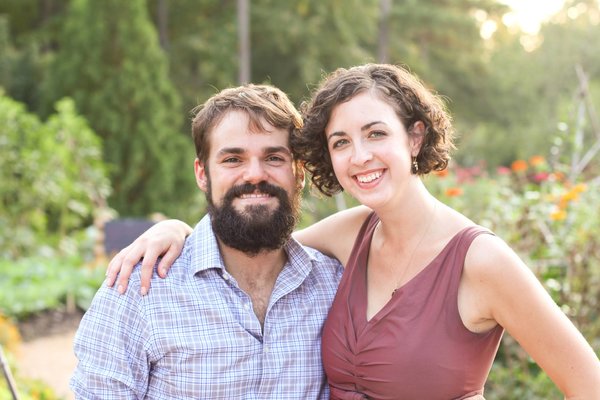MY DREAM OF MOTHERHOOD WAS ECLIPSED BY WIDOWHOOD
Katie Hawkins-Gaar

Surprisingly, grieving the death of a spouse mirrors the emotional landmines of new parenthood.
“We were adopting a baby.”
That’s the first thing I blurted out after my husband, Jamie, was pronounced dead. Although I was surrounded by emergency room staff, I was met with silence. No one knew what to say.
I didn’t know what to say, either. I sat stunned, holding Jamie’s lifeless hand, trying to wrap my head around how much had shattered in that moment.
Jamie and I began our journey into parenthood in October 2016, once we finally settled on an adoption agency. Over the next few months, we completed background checks, got letters of recommendation from friends and family, passed the in-home case worker visit, started reading parenting books and made some hefty agency payments.
Our next big hurdle was recording a series of videos — self interviews, testimonials from others and miscellaneous footage of our daily lives — that aimed to show prospective birth parents how well-rounded our lives were and how well-suited we were to raising a child. We recorded our final video on Jan. 31, 2017. It was a chilly Tuesday night, as we played volleyball with spirit, if not skill, for the camera.
Four days later, Jamie died. He was 32. He collapsed while running a half marathon, not far from the finish line where I was standing. The autopsy revealed that he had fibromuscular dysplasia of atrioventricular node arteries — in simpler terms, a rare and difficult-to-detect disease that can lead to sudden cardiac death.
I fully expected that 2017 would be the year I became a mother, not a widow. I envisioned witnessing our baby’s first breaths, not my husband’s final gasp. I anticipated soothing our crying child, not wiping away my own endless tears.
It’s now been almost three years since that fateful race. Plenty has changed since then. I’m 34, two years older than Jamie will ever be. I quit my full-time job and doubled down on my dreams of becoming a writer. I’ve done lots of solo traveling and have found solace in nature. I’m in a relationship with a wonderful and patient man, who’s teaching me what it means to love again.
One thing that’s remained consistent over that time is the reassurance I’ve received from other widows and widowers who have come before me, about both Jamie’s death and my thwarted dream of parenthood. They’ve told me what’s normal, what to expect, and what they were going through when they marked the same amount of time post-loss as I had.
My friend Stephanie reassured me that things won’t always feel so hopeless. My mother reminded me how she made sense of the world after my dad died. And I’ve learned so much from the wonderfully wise Nation, who taught me that grief never really goes away, but you learn how to live with it.
Navigating widowhood shares a surprising number of similarities with figuring out parenthood — or, at least, what I expected the experience would be like. Of course, there’s the important distinction that parenting means welcoming life instead of contending with death. But new widows and parents both obsessively count the days, weeks and months since their lives dramatically changed. They eagerly look for other people who are going through the same thing they’re experiencing. They gently tell each other that things will get easier — just after you make it past the next milestone.
There were plenty of moments where the present I was experiencing seemed cruelly juxtaposed with the future I had imagined. Just before his death, Jamie and I excitedly began to clean out closets to make room for a new member of our family. Now, I was faced with the difficult task of emptying Jamie’s closet and donating his belongings. Our would-be nursery remained a guest room, and our house — suddenly home to just me and my dog — felt bigger than ever.
In online groups and in-person meetups, I’ve noticed that widows introduce ourselves to each other by sharing how long it’s been since our partners died. That information offers valuable context. Just like caring for an infant is different from parenting a preschooler, there’s a vast difference in navigating grief at six months versus six years.
Those of us who have lost partners know that the first months of widowhood are a blur; it’s a struggle to digest our new reality. Four months out, for many of us, is when the loneliness becomes unbearable and we daydream about someday dating again. All the progress we thought we’d made falls apart around the one-year mark. And year two, nearly every widow I’ve met laments, is the toughest to face.
“Is this at all what parenthood feels like?” I asked in an online support group, wondering if my theory was sound.
The widows who are now solo parents — women and men doing an incredible job at a seemingly impossible task — shared how similar the extremes can feel. In both cases, you experience a significant shift in your identity. You have no idea what you’re doing, and worry how your early choices will affect the future. You face the reality that life will never be the same again.
In parenthood and widowhood, as in life, there are endless ups and downs. Amid the joys of parenting, there’s plenty of exhaustion and despair. Likewise, the heaviness of grief contains surprising moments of lightness. As parents and widows, your heart is broken wide open — you love deeper than you ever thought possible, and you find gratitude in the smallest moments. And whether you’re caring for a newborn or grieving a new death, you find yourself acutely aware of how fragile life truly is.
As one mother and young widow told me, “When my husband died, I gave birth to death.”
These days, I’m uncertain whether I want to become a mom, either biologically or through adoption. Sometimes, it feels like my uncertainty is rooted in fear. Other times, I’m unsure due to a lack of closure. I haven’t been able to mourn the loss of my hypothetical baby the way I’ve been able to mourn the death of my husband.
Many times, it simply seems pointless to head down this path once more. I allowed myself to be hopeful before. Why would I do it again?
Lately, though, I’ve had moments when I dare to dream again, and allow myself to imagine becoming a parent. Although it’s a surefire way to make me cry, I’ll occasionally watch our adoption footage, remembering how giddy Jamie and I once were. My favorite videos, the ones that make me cry the most, are of Jamie answering the agency’s pre-written questions, like what skills would make me a good mom.
“I think her ability to persevere, and to work harder than anybody else, is a skill that will benefit our kid,” said Jamie, chuckling at himself as he started to tear up. “I think she’s amazing. Her ability to persevere is incredible, and our child is going to benefit from that as well.”
When we recorded those videos, we had no idea they would one day become pep talks that kept me going. Widowhood, like parenthood, teaches you that you can’t control the way things turn out. I don’t know whether I’ll ever become a mom, but I’m grateful for the chance to even reconsider it.



